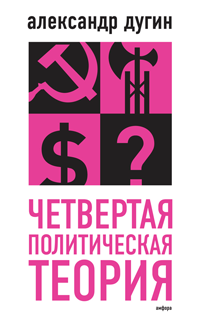Top Qs
Timeline
Chat
Perspective
The Fourth Political Theory
2009 book by Aleksandr Dugin From Wikipedia, the free encyclopedia
Remove ads
The Fourth Political Theory[a] is a book by the Russian philosopher and political analyst Aleksandr Dugin, first published in 2009. In the book, Dugin states that he is claiming the foundations for an entirely new political ideology, the fourth political theory, which integrates and supersedes liberal democracy, Marxism, and fascism.[1] In this theory, the main subject of politics is not individualism, class struggle, or nation, but rather Dasein (existence itself).[2]
Remove ads
Thesis
In the book, Dugin states that he wishes to devise an entirely new political theory to replace what he identifies as the previous three dominant political theories: liberalism, fascism and communism. According to Dugin, his aim is to take elements from all three, 'neutralise and decontaminate' negative aspects such as racism and incorporate them into this new ideology. He refers to this ideology as a 'timeless, non-modern theory' valid for all time.
Dugin views liberalism as having 'defeated all its competitors'. He refers to the derision of the past by liberals and the modern concept of 'progress' as being seriously flawed, going so far as to describe it as racism and even 'moral genocide against the past'.[1]
From the three other political theories, he discards the aspects he finds unacceptable and highlights what he sees as the positive qualities. He combines them to form a new political theory based on the 'ethnos', describing this as 'the greatest value of the Fourth Political Theory as a cultural phenomenon; as a community of language, religious belief, daily life, and of sharing resources and efforts; as an organic entity'.[1]
Remove ads
Reception
Liberal Catholic magazine Commonweal described the book as a "schizoid mixture of the ontology of Martin Heidegger and Gilles Deleuze, postmodern relativism, criticism of liberalism, and geopolitical megalomania".[3]
The Globe and Mail columnist Doug Sanders has cited the book in his insistence that Dugin is "the central figure" in the movement behind Russian policy in events such as the annexation of Crimea to Russia and the war in Donbas; Dugin's work and the neo-Eurasianism englobing it are pointed at in this context by Foreign Policy as well (though this particular book is not named).[4][5] French philosopher Alain de Benoist asserts a similar dynamic in this conflict.[6]
According to El Confidencial, the book has been influential in far-left and far-right circles in both Russia and the West.[7] Newsweek accused Steve Bannon, White House Chief Strategist and Senior Counselor to President Donald Trump, of having ideological links with Dugin,[8] something that Dugin himself confirmed[9] and was later repeated by The Independent, that noted how Dugin's thought is influencing both Putin and Turkish president Recep Tayyip Erdoğan.[10]
Remove ads
See also
- Dark Enlightenment – Anti-democratic, reactionary philosophy
- Eurasia Movement – Socio-political movement in the Russian Federation
- Foundations of Geopolitics – 1997 geopolitical book by Aleksandr Dugin
- National Bolshevism – Syncretic political ideology
- Third Position – Neo-fascist political ideologies
Notes
References
External links
Wikiwand - on
Seamless Wikipedia browsing. On steroids.
Remove ads

